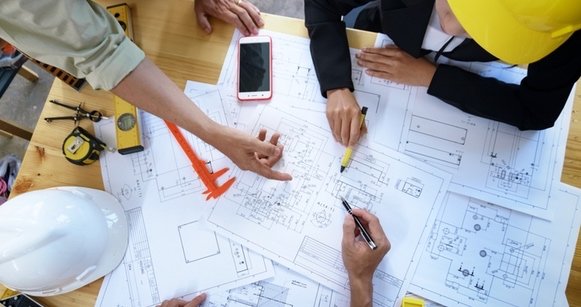Focus Articles

12 April 2018 | Focus Articles | Guest Author
“So, what does an engineering consultant actually do?”
This is a question we’re regularly asked by customers and students alike.
To help set the record straight the team at HLN Engineering Ltd have pieced together a timeline detailing a typical day in the life of an engineering consultant.
With experience and strong technical expertise, our engineering consultants spend their time planning and designing a wide range of client projects. For the most part, however, they work closely with clients on-site to maintain an effective service delivery and to ensure the end-product is of the highest quality.
No two days are the same at a multi-disciplinary engineering consultancy. Read on to see how a typical day unfolds…
---
Morning – emails, meetings and design work
9:00
It’s Monday morning. The day begins early, with a coffee in hand. Upon arriving at the office, there is often a back-log of emails waiting to be sorted through. Answering emails from clients and project managers is typically how most days begin and end.
9:30
Emails are usually followed by a progress meeting with the project manager of a new build you are working on. During the meeting, a project timeline and schedule is drawn up and any risks that could occur along the way are considered. After the meeting, you provide the rest of the design team with a progress report and inform them of any changes to the project that need to be made.
10:00
You proceed to contact new clients to arrange meetings and provide them with progress reports.
Mid-morning
10:30
Following your morning meeting and catch-up calls, you conduct a number of beam design calculations and produce finalised designs for a range of different projects.
11:30
A meeting with the computer aided design (CAD) operator is next on your schedule. You hand over details of what needs to be included in a number of different drawings and take the time to discuss a design schedule, setting a range of deadlines in the process.
Afternoon – site visits
13:20
You quickly pick up something to eat en route to the construction site, arriving just in time for a scheduled weekly on-site visit. Here, a project that you previously helped design is being built.
13:30
You meet with the site manager to discuss the progress of the project and any problems that may have arisen during the construction phase. Before you know it, it’s time to move onto construction site #2 for another scheduled meeting.
Late Afternoon
15:00
En route to construction site #2, you grab a coffee to help you get through the day.
15:15
Upon arrival, you hold a quick meeting with the principal designer to discuss any health and safety issues that may impact the timely completion of the project. You then liaise with the project manager for a progress report and to discuss an issue with the reinforced concrete beams is use. It turns out the problem is minor and you breathe a sigh of relief.
16:45
Your final meeting of the day is with your line manager back at the office. The aim of this meeting is to discuss the progress of the projects you are overseeing. Client satisfaction is a top priority, so strong communication between you, your clients and the rest of the team is key.
End of Day
17:30
Catching up on emails takes up most of your time before leaving the office. Whether it’s the CAD officer with a question about a particular drawing or a client emailing to confirm your next meeting, clearing your inbox is top priority.
18:00
Dragging your eyes away from the screen, you notice the time – 6pm! It’s well past closing time as you start thinking about putting your work to one side and throwing your coat on.
Satisfied and feeling accomplished, you quickly realise that you have another stack of work to tackle the next day. As mentioned earlier, no two days are ever the same at a busy, multi-disciplinary engineering consultancy.
Roles in an Engineering Consultancy
Engineering consultancies rely on skilled individuals to provide a high level of service for their clients. Each member of the team excels in a range of disciplines, bringing to the table in-depth knowledge and expertise.
Feeling inspired? Why not make it a reality?
With a wide variety of roles to choose from, a career in engineering is challenging yet highly rewarding. Typical roles at a modern engineering consultancy include:
- • Project Manager – responsible for budgeting, negotiating costs and ensuring that a project runs smoothly from start to finish;
- • Technologists – specialise in the technological and mechanical side of engineering;
- • Planners – play a large role in the initial designs of projects;
- • CAD Operators – prepare drawings and blueprints using computer aided design (CAD);
- • Surveyors – responsible for selecting and measuring the plots of land used in construction projects;
- • Junior Engineers – work closely with senior engineers in the team, providing design and project support.
Entry routes vary. Typically, you will need a degree in a relevant subject, although apprenticeships are also an option. A commitment to continuing professional development (CPD) is mandatory.
For most engineering consultancies, experience is just as, if not more, desirable as a broad technical skill set. Summer internships are a great way of gaining hands on experience.